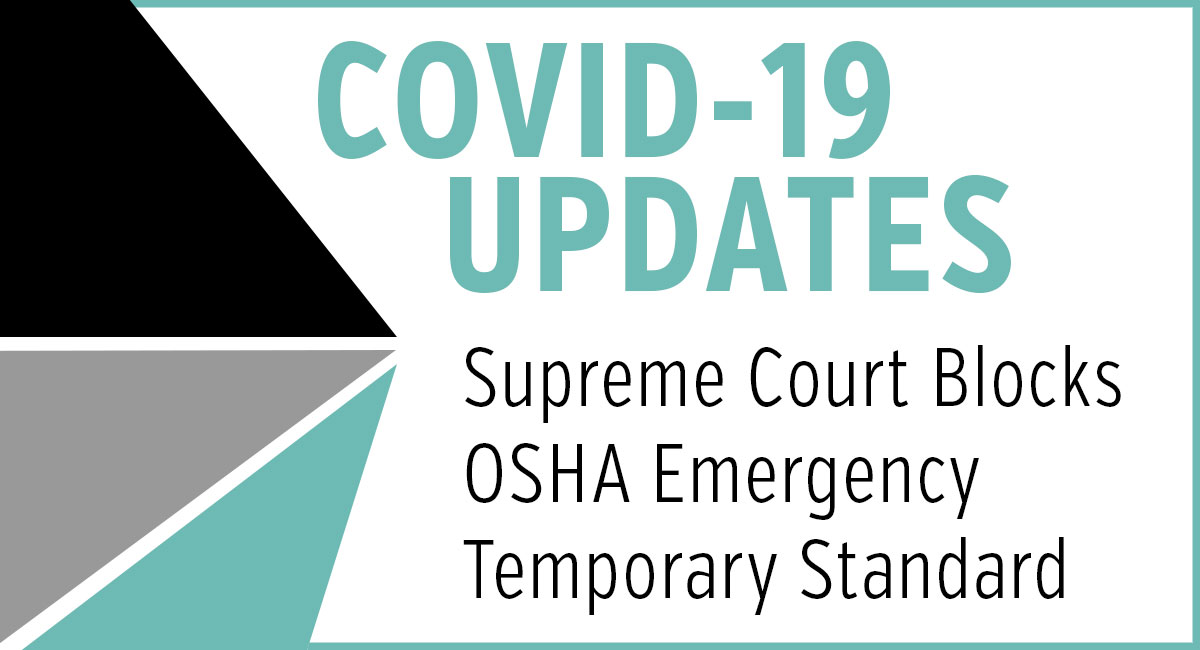Supreme Court Blocks OSHA ETS

January 15, 2022 by Keely Knopp
UPDATE 2/4/22: Effective as of January 26, 2022, OSHA has withdrawn the vaccination and testing emergency temporary standard. Although its withdrawing it as an enforceable ETS, the agency is not withdrawing it as a proposed rule. The agency is prioritizing its resources to focus on finalizing a permanent COVID-19 Healthcare Standard. OSHA strongly encourages vaccination of workers against the continuing dangers posed by COVID-19 in the workplace.
The long awaited and much debated OSHA Emergency Temporary Standard concerning vaccine and testing mandates has been struck down by the U.S. Supreme Court. So, what does this news mean for employers? Experts suggest that, while companies can relax on implementation of the OSHA ETS, they should continue to prepare policies and procedures for employees, including the following:
1. Complete your administrative obligations
The Supreme Court technically didn’t kill the OSHA ETS altogether, but rather reapplied the temporary injunction on implementation while lower courts continue to battle its validity.
If the lower courts rule that all or part of the ETS can proceed to implementation, OSHA likely will begin that implementation immediately, so having your company’s administrative tasks in hand will be helpful. These would include creating an employee roster and collecting vaccination status for your employees, which is lawful under EEOC and HIPAA regulations.
Also, begin developing vaccine and testing policies of your own, making sure those policies are adapted to your unique workplace. At a minimum, the policies should include:
- a mechanism for employees to report positive COVID-19 tests.
- policies regarding positive COVID-19 employees in the workplace.
- paid leave for employees to get vaccinated.
- ensuring unvaccinated and not fully vaccinated employees wear face coverings when indoors or when occupying a vehicle with another person.
- developing educational sessions for employee compliance with company policies.
2. Determine if your company will impose its own mandates
Regardless of the SCOTUS ruling, it is legal in most states for companies to apply their own mandates regarding vaccinations and testing for COVID-19. Consult your company’s legal counsel prior to implementing these types of policies and exemptions.
3. Consider safety obligations for unvaccinated employees
You may want to consider requiring unvaccinated employees to comply with additional safety measure protocols, such as masking requirements or other PPE, physical distancing, or office and travel restrictions. Consider establishing these policies ahead of time to avoid disruption in your workforce.
4. Testing requirements
You can require unvaccinated employees submit to COVID-19 testing on a regular basis. However, you may want to consider the following before implementing this type of policy:
- Communicate the new policy with your workforce in a clear and direct manner.
- Determine how often you will have employees submit to testing. It should be frequent enough to catch potential outbreaks of COVID-19, but not so frequent as to seem punitive.
- Ensure testing protocols comply with applicable wage and hour laws.
- Consider the ability of your workers and your organization to obtain COVID-19 tests in your community before instituting your policy.
Mercy Urgent Care can help employers with testing on a companywide scale. Please contact us at mom@mercyurgentcare.org or (828) 254-7576 to discuss options for your employees.
5. Health insurance surcharges
Similar to a nicotine surcharge that some employers already have in place as part of their wellness programs, you may consider imposing an additional surcharge on health insurance premiums for those who are unvaccinated. This type of policy needs to be discussed with your company’s legal counsel to ensure compliance with state and federal laws
6. Incentives for vaccination
The most common incentives employers offer to workers who can prove full vaccination status include cash, gifts or paid time off. If employees voluntarily provide documentation confirming they have been vaccinated on their own, you can offer incentives with few limitations. However, if your company (or an entity acting on your organization’s behalf) administers the vaccine, incentives cannot be so substantial in value, as it could be considered coercive.
Experts encourage businesses to start planning and implementing company policies as early as possible regarding COVID-19. Planning ahead and ensuring that your company has solid policies and procedures in place helps create stability for workers during uncertain times and may help ensure your compliance should OSHA instate additional COVID-19 policies.
Mercy Urgent Care can help companies navigate compliance challenges and get set up for employee testing procedures. Please contact our Occupational Medicine staff at mom@mercyurgentcare.org or (828) 254-7576.
Source: OSHA, JD SUPRA

